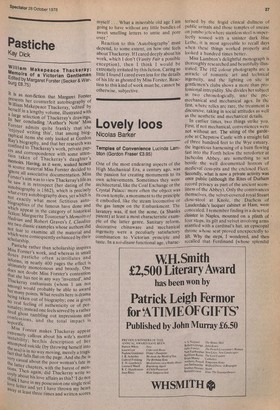Pastiche
Kay Dick
William Makepeace ThackeraY: Memoirs of a Victorian Gentleman Edited by Margaret Forster (Sacker & Warburg £8.75) It is as non-fiction that Margaret Forster Presents her counterfeit autobiography of William Makepeace Thackeray, `edited' by herself in a lengthy volume, illustrated with a large selection of Thackeray's drawings. In her concluding -!Author's Note' Miss Forster admits quite frankly that she 'enjoyed writing this', that among biographical items she only looked at Gordon Ray's biography, and that her research was confined to Thackeray's work, private Papers and correspondence with some attention taken of Thackeray's daughter's Memoirs. Having, as it were, soaked herself in source material Miss Forster decided to ignore all associative documentation. Miss Forster's aim was to view Thackeray's life as he saw it in retrospect (her dating of the autobiography is 1862), which is precisely What every autobiography does, yet which is not exactly what most fictitious autobiographies of the famous have done and Which appear in the category of historical fiction: Marguerite Tourcenar's Memoirs of Hadrian and Robert Graves's I, Claudius are two classic examples whose authors did not fear to examine all the material and Which were consequently enhanced by their scholarship. P • astiche rather than scholarship inspires Miss Forster's work, and whereas in small doses pastiche often scintillates and ; 'nf°rms, in nearly 400 pages the effect is Ultimately monotonous and broody. One does not doubt Miss Forster's contention that she has not in any way 'invented', and Thackeray enthusiasts (whom I am not her would probably be able to award being many points. What results here is drama e'eing taken out of biography; one is given no real feeling of authenticity or of Personality; instead one feels served by a rather tired ghost rambling out impressions and confessions, and the total impact is soPorific, Miss Forster makes Thackeray appear e. Itremely callous about his wife's mental instability; her/his description of her attempted suicide (by throwing herself into the sea) is in no way moving, merely a tragic tact that falls flat on the page. And she/he is v.erY casual about the poor woman's fate in tne latter chapters, with the barest of mentions. Then again, did Thackeray write so coyly about his love affairs as this? `I do not think I have in my possession one single real away letter and yet I have Thrownmy heart dway at least three times and written scores_ myself. . . What a miserable old age I am going to have without any little bundles of sweet smelling letters to untie and pore over.'
Reaction to this 'Autobiography' must depend, to some extent, on how one feels about Thackeray. If I cared deeply about his work, which I don't (Vanity Fair a possible exception), then I think I would be extremely irritated by this fiction. Caring so little I found I cared even less for the details of his life as ghosted by Miss Forster. Reaction to this kind of work must be, cannot be otherwise, subjective.






































 Previous page
Previous page